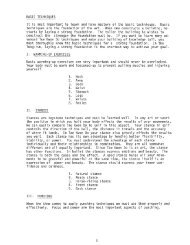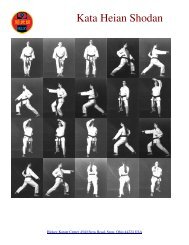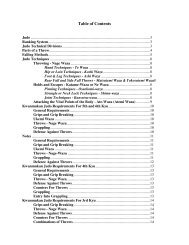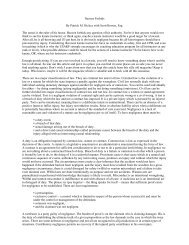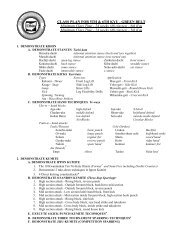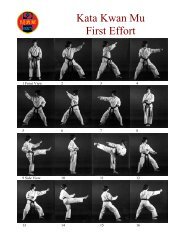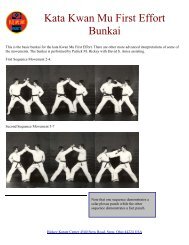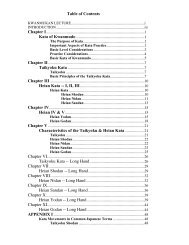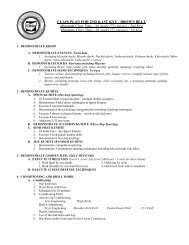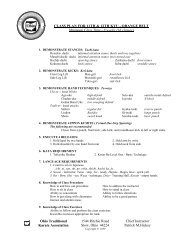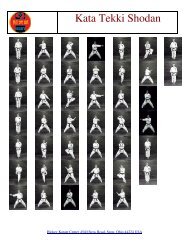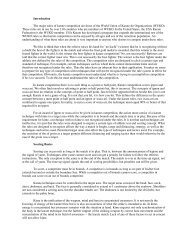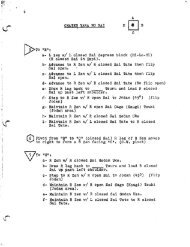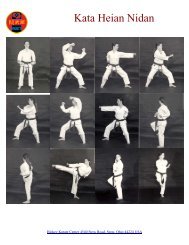WUKO Recognition - Hickey Karate Center
WUKO Recognition - Hickey Karate Center
WUKO Recognition - Hickey Karate Center
- No tags were found...
Create successful ePaper yourself
Turn your PDF publications into a flip-book with our unique Google optimized e-Paper software.
In the twilight of karate being admitted into the Pan American Games, the Asian Pacific<br />
Games, the Mediterranean Games, the African Games and the Caribbean Games the hammer is<br />
lowered on the World Union of <strong>Karate</strong>-do Organizations (<strong>WUKO</strong>) by the IOC. In Barcelona on<br />
July 16, 1992, a decision was made by the IOC executive committee to withdraw the recognition<br />
which was granted to the World Union of <strong>Karate</strong>-do Organizations in 1985. Why was now the<br />
time the action taken that can remove the forward advances of karate into the various continental<br />
games.<br />
Word out from Spain is that Taekwondo will not make official medal status in the<br />
Olympics despite two times being an unofficial demonstration sport. In 1983 Walther Troeger<br />
sports director of the IOC wrote to the International Taekwondo Federation (ITF), "the IOC<br />
decided to encourage the WTF (World Taekwondo Federation) and the ITF to merge. In fact,<br />
taekwondo unification is likely to be the sole step to be taken in order to ensure an equal<br />
opportunity for those who practice your sport..." On October 15, 1984 Monique Berlioux,<br />
Director of the IOC writes, " This is to inform you that Taekwondo will not be included in the<br />
programme of the Games of the XXIV Olympiad as it is not an Olympic Sport. Its<br />
demonstration in Seoul on the occasion of the Games would be possible should the Organizing<br />
Committee so requests. In this case, the situation concerning the existing two IFs (International<br />
Federations) governing taekwondo would have to be clarified." Yet on August 27, 1991 the ITF<br />
writes to <strong>WUKO</strong>, " Our application has been made to the IOC once more for recognition and we<br />
await their decision." Yet taekwondo has been a demonstration sport under the WTF two<br />
Olympiads in a row with two competing organizations.<br />
Lets take a look back in time and see if we can put some of the pieces together by<br />
following the paper trail.<br />
In 1983, a merger was achieved in Cairo between the <strong>WUKO</strong> and the International<br />
Traditional <strong>Karate</strong> Federation(ITKF previously know as International Amateur <strong>Karate</strong><br />
Federation (IAKF). This became known as the "Cairo Accords". Article 2 of the agreement<br />
stipulates, "<strong>WUKO</strong> and IAKF (having become ITKF) are united with effect from this date, into a<br />
confederation. The confederation will operate as long as it will be necessary to inaugurate a new<br />
unifier world governing body". This agreement was signed by Jacques Delcourt, H. Nishiyama,<br />
Paul Hoglund, Jon Evans, David Mitchell, Nadir Sherif, and Fritz Wendland to name a few of<br />
the representatives of each organization.<br />
At the 1985 Berlin session of the IOC, a report entitled "REPORT ON KARATE<br />
PRESENTED BY H.E. MR. GUIRANDOU-N'DIAYS" made the following observations:<br />
"Referring to certified official documents, I can confirm that at the end of 1984 the <strong>WUKO</strong><br />
comprised 85 member countries, 55 of which are recognized by their NOC or the highest sports<br />
authority of their respective country. Of these 85 countries, ten have affiliated the shotokan<br />
section" to the IAKF. At the same period, the IAKF comprised six federations recognized by<br />
their NOC or highest sports authority of their country, that is Egypt, Libya, Iraq, Peru and<br />
Yugoslavia." The report further stated, "The eventual unification of the <strong>WUKO</strong> and the IAKF<br />
should in no circumstances be considered as a question to be settled before the IOC grants its<br />
recognition to the <strong>WUKO</strong>." Based on this report, the <strong>WUKO</strong> was recognized. In a letter to<br />
Jacques Delcourt (<strong>WUKO</strong>'s Executive President) from Walther Troeger, Sports Director of the<br />
IOC, it states, "When the IOC made its decision in favour of <strong>WUKO</strong>, it did so because of its<br />
conviction that you represent the majority of sportsmen, in order to not deprive this majority of
the IOC's recognition any longer and because it seemed very likely that an agreement between<br />
both federations representing karate could not be reached in the near future."<br />
So far so good, but it gets complicated. In December 1989 <strong>WUKO</strong> received pressure to<br />
unify with the ITKF. On January 10, 1990 in the presence of Mr. Vazques Rana, president of the<br />
Association of National Olympic Committees (ANOC), in Mexico City a second agreement<br />
between <strong>WUKO</strong> and the ITKF was signed. This agreement read. "The representatives of the<br />
<strong>WUKO</strong> and the ITKF agree to unification under the mediation of President Mario Vazquez<br />
Rana, compromising to report to him on all the advances made on the future negotiations. The<br />
participants, representatives of <strong>WUKO</strong>: Mr. Jacques Delcourt and HRH Prince Adan Czartorski-<br />
Borbon and ITKF: Mr. Hidetaka Nishiyama and Mr. Eduardo Salas Pooley, accept the<br />
commitment to inform their respective executive boards about the following points: I. the<br />
unification of <strong>WUKO</strong> and the ITKF. II. The structuration of an executive board proposal by<br />
President Marion Vazques Rana." An executive board was structured with Mr. Jacques Delcourt<br />
as the president.<br />
On January 31, 1991, Nishiyama writes "Based on the IOC decision, a unification<br />
meeting was held on January 10, 1990, in Mexico City and mediated by Mr. Mario Vazquez<br />
Rana, President of ACNO. During the meeting, both the <strong>WUKO</strong> and the ITKF agreed to form a<br />
unified body and accepted the basic structure of that new body in which Traditional <strong>Karate</strong> of the<br />
ITKF and "Modern <strong>Karate</strong>" (tentative name) of <strong>WUKO</strong> would both hold equal position, a<br />
proposal made by the mediator and which was accepted by both organizations."<br />
In April of 1991 the IOC wrote to the <strong>WUKO</strong> extending the deadline for unification and<br />
warned of possible loss of recognition if unification did not take place. This deadline was<br />
extended to December 31 of 1991. <strong>WUKO</strong> had to achieve the unification with the ITKF to keep<br />
its recognition. This mandate put the <strong>WUKO</strong> at a serious disadvantage with the ITKF. If the<br />
ITKF did not agree to the negotiations, <strong>WUKO</strong> would lose recognition.<br />
Also in 1991 <strong>WUKO</strong> asked for help from the IOC in order to resolve the problem of<br />
organization of the two unified federations following the Mexico agreements. A project for<br />
internal unification (Protocol) was submitted to the Executive Commission of the IOC who gave<br />
its agreement in principle in September of 1991. This protocol was endorsed by the <strong>WUKO</strong> but<br />
was refused by the ITKF. In March of 1990 a survey was taken by the IOC about the<br />
representation of ITKF at the world level. The report states, "Out of 122 answers, the ITKF is<br />
represented (generally by a few clubs) in 14 countries for a total number of about 50,000<br />
practitioners. According to the total number of practitioners in the world - about 40 millions -<br />
and the total number of practitioners inside the 14 countries of the ITKF - 50,000 - we can<br />
conclude that the ITKF represents about 0.1% of world karate. In the 14 countries where ITKF<br />
is represented, <strong>WUKO</strong> federation only is officially recognized either by the NOC'c or the<br />
Ministries of Sport." Further, Françios Carrard of the IOC advised the ITKF that, " if unity were<br />
not achieved within karate by December 31st, 1991, the withdrawal of the <strong>WUKO</strong> recognition<br />
would not result in to the ITKF's recognition. Thus it should be clear that you must actively and<br />
constructively help the <strong>WUKO</strong> to be successful in its efforts of unification." A few weeks later,<br />
Nishiyama writes back, " both the ITKF and <strong>WUKO</strong> officially agreed to unification ... We would<br />
like to again state that we will cooperate in all unification efforts."
In November of 1991 Rick Jorgensen, Secretary of the ITKF Negotiating Committee<br />
wrote to Mr. Fritz Wendland, 2nd Vice President of <strong>WUKO</strong>. " Consequently, the ITKF will be<br />
reporting to the IOC the futility of its efforts and recommend the IOC proceed with the<br />
consequences outlined in its directive last year [the withdrawal of the <strong>WUKO</strong> recognition, SIC].<br />
The general gist of the argument can be seen in a letter written in December of 1991 by<br />
Rick Jorgensen to Fritz Wendlend, " the ITKF is not seeking recognition through the <strong>WUKO</strong><br />
organization." The protocol provided by <strong>WUKO</strong> allowed organizations or associations to join<br />
the <strong>WUKO</strong> as "allied" members. In March of 1992 Delcourt wrote to Nishiyama, "I offered you<br />
at first to participate with us (<strong>WUKO</strong>) in the main sporting events for our 141 country members :<br />
World Championships, Pan-American, Asian, African Games, and so on, by creating a category<br />
for the ITKF." Nishiyama replies in April of 1992, " The difficulty I see with your proposed<br />
"protocol" is that it is simply an invitation for the ITKF to join <strong>WUKO</strong> as a subordinate<br />
organization. However, as we have discussed many times before, the basic principles of<br />
traditional karate, as practiced by the ITKF and its athletes and coaches, are very different from<br />
those followed by <strong>WUKO</strong>. ... Accordingly, we propose that rather then <strong>WUKO</strong> joining the ITKF<br />
or the ITKF joining <strong>WUKO</strong>, we join together in the formation of a new, unified organization in<br />
which the <strong>WUKO</strong> and ITKF disciplines can co-exist as distinct branches within the Olympic<br />
program..." After a meeting in Los Angeles with Nishiyama, Delcourt writes, " I am very eager<br />
to tell you how satisfied I am about the discussions we've just had in Los Angeles. It was the<br />
first time I felt there was some esteem on both sides and the beginnings of friendship ... . Now<br />
the problem will be to bring out points of view and we know that this won't be easy for there are<br />
- from your side as well as from our side - inflexible positions of principle." Nishiyama replies 3<br />
days later, " I must say that the ITKF was quite disappointed with the results of that meeting,<br />
inasmuch as <strong>WUKO</strong> only repeated its previous proposal that the ITKF join <strong>WUKO</strong>. ... My<br />
feelings are that we spent two days talking about two different subjects, domination and<br />
unification with no common ground ever being established...." Delcourt replies, I do not<br />
understand and I am also very suprised at your interpretation of the position of <strong>WUKO</strong>. We<br />
have never spoken about "domination". Our position is made of two proposals: either a merging<br />
in <strong>WUKO</strong> giving all guarantees for an incorporation of ITKF at every level. Such a merging -<br />
which is achieved every day either in the sporting or in the business field - is not dishonorable at<br />
all. - or you want to remain totally independent for some reasons of your own, and then we<br />
propose the "Protocol " which got the agreement of principle from the IOC Executive Committee<br />
and also grants you all guarantees, respects your independence, enables your coming into the<br />
"Olympic family". Moreover we also granted your further advantages that we didn't offer the<br />
various associations which have already signed the Protocol. On the occasion of our meeting in<br />
Los Angeles, the members of the ITKF that were present were ready to discuss the "Protocol"<br />
point by point but you opposed. ... ". Nishiyama writes back, "From the contents of your May<br />
18, 1992 letter (quoted above), I understand that <strong>WUKO</strong>'s "protocol ", which requires the ITKF<br />
to become a member of <strong>WUKO</strong> is still your final position with respect to the unification of our<br />
two organizations." Delcourt of <strong>WUKO</strong> replies on June 12, " Your proposal to have a parallel<br />
co-existence of <strong>WUKO</strong> and ITKF under a kind of "umbrella" is a division for ever and not a<br />
unification which means "Unity": one sole body. ... If you don't want this protocol, I will be<br />
prepared to study other proposals from you." Continuing the letter campaign, Nishiyama writes,<br />
" <strong>WUKO</strong> sport karate and ITKF traditional karate are two separate disciplines. ... until you are<br />
willing to negotiate with ITKF as an equal, I fear unification will elude us." Shortly thereafter<br />
the hammer fell.
On July 16, 1992 the IOC executive committee withdrew the recognition of <strong>WUKO</strong><br />
stating, "The <strong>WUKO</strong> has not achieved the unification of karate by the deadline appointed to that<br />
effect. It has known since April 1991 that it is in danger of having its recognition withdrawn; it<br />
has had the opportunity to put its point of view to the IOC: Inasmuch as this situation is linked<br />
to a conflict virtually insoluble at present, it seems today that the sole means whereby a<br />
development may be brought about is by not maintaining the recognition granted to the <strong>WUKO</strong><br />
in 1985. The withdrawal of recognition of the <strong>WUKO</strong> therefore seems inevitable in order to<br />
unblock the situation. However, it is appropriate to accompany this measure, which is not a<br />
punishment, with an encouragement in the form of an assurance to the <strong>WUKO</strong> that, if it can<br />
achieve the unity of karate within a short time, it will quickly regain its status within the<br />
Olympic Movement. This could be the case if <strong>WUKO</strong> succeeds in unifying karate between now<br />
and 15th September, 1993."<br />
The length of texts is very long and contains much information. This is only a short<br />
synopsis. The differences in approach by both <strong>WUKO</strong> and the ITKF to what is meant by<br />
unification fuels the argument. <strong>WUKO</strong> wants one body where everyone can be represented and<br />
where the associate members can go about their own business. The ITKF wants a co-equal<br />
partnership even though documentation at the IOC shows the ITKF a small body. Further, the<br />
ITKF maintains its karate is a different discipline then <strong>WUKO</strong> and thus cannot merge. Will the<br />
IOC decision which is designed to force the bodies into an agreement by demonstrating IOC<br />
seriousness in resolving the problem work. It will be an interesting year.<br />
What can you do You could have everyone in your dojo send a separate letter to the<br />
IOC. You could state how disappointed you are in the action of the IOC and that you think that<br />
this action is misguided. You could express your concern that other sports can have two<br />
International Federations and why should <strong>WUKO</strong> be penalized by forcing a small IF to unify<br />
when its power is nothing. You could express your opinion about Nishiyama's actions. You<br />
could express your support of the <strong>WUKO</strong> position. You could ask the IOC to reply to your<br />
letter. This ITKF has done such a mailing effort. The IOC can be written by writing to : H.E.<br />
Juan Samaranch, Chateau de Vity, - CH - 1007 Lausanne, Switzerland. Americans pay the most<br />
bill of the Olympics. We should be able to express our opinions about the sports we would like<br />
to see.



